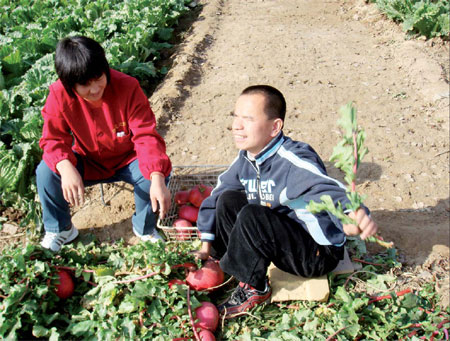Grassroots love
Updated: 2011-12-02 11:49
By Mike Peters (China Daily European Weekly)
|
|||||||||
|
 Organizers of Bethel orphanage says happy children are the measure of their success. [Photos Provided to China Daily] |
Kind-hearted couple helps Chinese orphans find their way in the world
There is a buzz of energy this morning at Bethel China Foundation's orphanage facility in Beijing's southeast suburbs. Guillaume Gauvain, the 34-year-old founder of the non-profit agency, has just come through the front door, and news of the arrival of "French Father" is rippling amid the grade-school age students milling between classes. "Faguo Baba, Faguo Baba, Faguo Baba!" the children exclaim.
The telegraph-style murmurs offer information and confirmation; most of the kids scooting along the hallway can't see Faguo Baba.
They never have, and they never will. And the smiles and giggles that follow him as he strides to his office suggest that's not really important.
If everything you know about orphanages comes from reading Charles Dickens, Bethel can be a slight shock.
"People come expecting a situation that's sad, poor, dirty," Gauvain says, grinning. "Instead it's bubbling, full of life. We have rock-climbing, busy playgrounds, children speaking English, French and Chinese.
"That is our success: happy kids."
Gauvain and his wife, Delphine, founded this orphanage for blind kids eight years ago, in an organic process that continues today.
He left France at 19 to study in the US, where he met his wife-to-be. They moved to Canada, working in a social program for drug addicts and prisoners.
Then they met someone who was working in China and thought, "that could be the next step". They started studying Chinese - simple, practical conversations out of books - sold what they had, and headed to Beijing.
"We lived on my earnings as a jazz piano teacher for the first one-and-a-half years," he says.
The couple was also volunteering at a foster care facility, and there they met David, an 8-month-old baby born with a cleft palate.
Their personal odyssey in China was about to take shape.
"After adopting David, we thought, 'If it's in our means to help more than one child, why stop there?" he says.
Young David, now 9, is not blind, but Guillaume and Delphine discovered after some research that blind orphans as a group were not well-served in China. There were groups and institutions that helped special-needs kids, he says, but they didn't focus on specific disabilities.
"We thought blindness was a situation we could learn about, and that it was within our ability to care for," he says.
So the couple headed for Langfang, southeast of the capital, where they could buy a bigger house, then took in two orphans from the same facility where they found David.
They bounced to a second house, then a third and fourth as the number of kids - and a school - grew under their roof.
But their hearts and ideas were bigger, and so Guillaume went looking for land. And despite having no business management training - "I think some people just have this ability naturally" - he went into high gear for fund-raising.











